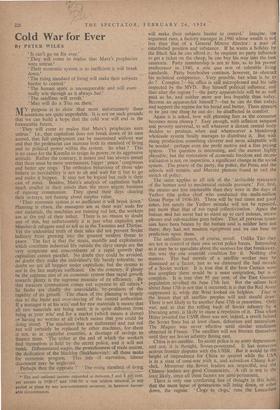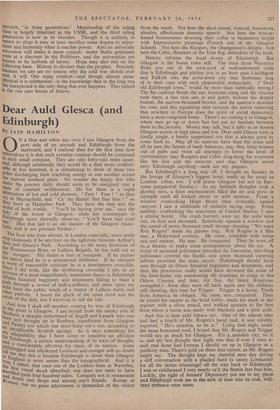Cold War for Ever
It can't go on for ever.'
They will come to realise that Marx's prophecies were untrue.'
Their economic system is so inefficient it will break down.'
The rising standard of living will make their subjects harder to control.'
The human spirit is unconquerable and will even- tually win through as it always has' ' The satellites will revolt.' ' Mao will do a Tito on them.'
AtY purpose is to show that most unfortunately these IVA assertions are quite improbable. It is not on such grounds that we can build a hope that the cold war will end in the foreseeable future.
They will cone to realise that Marx's prophecies were untrue.' 1.e.' that capitalism does not break down of its own accord, that full employment can be maintained without war and that the proletariat can increase both its standard of living and its political power within the system. So what ? This is no cause for the Kremlin to resign its power, or its aggressive attitude. Rather the contrary, it means and has always meant that there must be more rearmament, bigger `peace' congresses and better spy rings: The orthodox behaviour of those who believe in inevitability is not to sit and wait for it but to go and make it happen. It may not be logical but such is their cast of mind. Besides, Marx's analysis of capitalism bulks much smaller in their minds than the more urgent business of running communism. They spend their days clearing their in-trays, not fussing about surplus value. ' Their economic system is so inefficient it will break down.' Planning is chaos, the managers are at their wits' ends for raw materials, the machines are running red hot, the workers are at the end of their tether, There is no reason to doubt any of this, but unfortunately it is just what capitalist and Menshevik refugees used to tell us in the Twenties and Thirties. Yet the undoubted truth of their tales did not prevent Soviet industry from growing into the greatest modern threat to peace. The fact is that the strain, muddle and exploitation which constitute industrial life outside the slave camps are the very symptoms and concomitants of a rapid growth that capitalism cannot parallel. No doubt they could be avoided, no doubt they make the individual's life barely tolerable, no doubt we are all happier under capitalism; but the system is not in the last analysis inefficient. On the contrary, if plenty be the supreme aim of an economic system then rapid growth towards plenty is the supreme measure of its efficiency. By that measure communism comes out superior. to all others.* Its faults are chiefly the unavoidabk by-products of the rapidity of its growth. The chaos of the planning is largely due to the haste and over-driving of the central authorities. If a manager is at his wits' end for raw materials it means that all raw materials are being used; it is quite different from being at your wits' end for a market (which means a slump) or having no worries at all (which means that you could be doing more). The machines that are maltreated and run red hot will certainly be replaced by other machines, for there is not, as in capitalist countries, a shortage of savings to finance them. The tether at the end of which the workers find themselves is held by the secret police, and it will not break. Differentiated wages, the powerlessness of trade unions, the deification of the blackleg (Stakhanovite): all these make for economic progress. This side of starvation, labour discontent may be neglected. Will make their subjects harder to control.' Imagine, the argument runs, a factory manager in 1960 whose wealth is not less than that of a General Motors director: a man of established position and substance. If he wants a holiday by the Black Sea he can afford it : he requires no party influence to get a ticket on the cheap, he can buy his way into the best sanatoria. Party membership is not to him, as to his poorer predecessor in 1940, a sine qua non of tolerable living standards. Party busybodies continue, however, to obstruct his technical competence. Very possible, but what is he to do ? Conspire ?—his office is still microphoned and his safe inspected by the MVD. Buy himself political influence, and thus alter the regime ?—the party apparatchiki will be as well paid as he, and neither more nor less buyable than today. Become an apparatchik himself ?—but he can do that today, and support the regime for his bread and butter. There appears to be just one thing he can do : be disaffected in comfort.
Again it is asked, how will planning fare as the consumer becomes more choosy Easy enough, with inflation rampant and poverty universal, to sell whatever a distant central body decides to produce, when and wheresoever a blundering wholesale system 'finally manages to distribute it. But with rising production something cleverer and more adaptable will be needed : perhaps even the profit motive and a free pricing system. The question is interesting, and the answer highly plausible; but the restoration of economic freedom and decen- tralisation is not, on inspection, a significant change in the social systeth. The power of the party, the police, the Press, and the schools will remain, and Marxist phrases found to veil the switch of policy.
The same applies to all talk of the invincible resistance of the human soul to mechanical outside pressure.' For, first, the strains are less intolerable than they were in the days of Yezhov (the police chief who conducted the multi-million Great Purge of 1936-38). There will be bad times and good times, but surely the Yezhov mistake will not be repeated, any more than that of too rapid collectivisation. Again the human soul has never had to stand up to card indexes, micro- phones and sub-machine guns before. That all previous tyran- nies have been beaten by the human soul is neither here nor there; they had not modern equipment and we can base no prediction upon them.
The satellites cannot, of course, revolt. Unlike Tito they are not in control of their own secret police forces. Interesting as it may be to speculate about the motives for that breakaway, this was the one essentitil condition for it. Nothing else matters. The bad morale of a satellite worker may he dismissed as a factor, just as we dismissed the bad morale of a Soviet worker. It is true that if the Iron Curtain were less complete there would be a mass emigration, but it ry complete. It is true that 95 per cent. of the East German population revolted on June 17th last. But the salient fa:t about June 17th is not that it occurred; it is that the Red Army .suppressed it, while the West looked on helpless. That is the lesson that all satellite peoples will and should dray,'. There is not likely to be another June 17th in peacetime. Only war, and at that the rolling back of Soviet infantry by a liberating army, is likely to cause a repetition of it. Thus when Hitler invaded the USSR there was not, indeed, a revolt behind the Soviet lines but at least chaos, defeatism and neutralism. The Maquis was never effective until similar conditions obtained in France. The satellites will not liberate themselves until they see Soviet infantry fleeing east. China is no satellite. Its secret police is an army department, and not, it is thought, Soviet-penetrated. It has numerous serious frontier disputes with the USSR. But it would be the height of imprudence for China to quarrel while the USA is in a state of semi-war with it, and subsidises Chiang Kai- shek. Moreover the Soviet leaders are respectful, and the Chinese leaders are good Communists. A rift is not in the least likely, since all these factors are semi-permanent. Proverb, in three generations.' Membership of the ruling class is largely inherited in the USSR, and the third ruling generation is now in its twenties. Though it is ,unlikely to return to clogs it may at least sacrifice some dogma to enjoy- ment and humanity when it reaches power. Also its university education will make it more cynical: under Stalin graduates Were at a discount in the Politburo, and the universities are known to be hotbeds of heresy. Hope may also rest on the following base. History is cleverer than the prophet. Precisely because we can see no reason why the cold war should ever end, it 'will. Our main comfort—and though almost meta- Physical.it is substantial—is the knowledge that in the long run the unexpected is the only thing that ever happens. This indeed Is the one sure lesson of history.



































 Previous page
Previous page